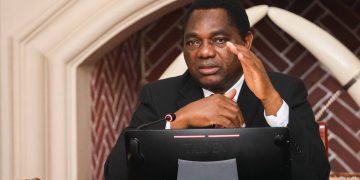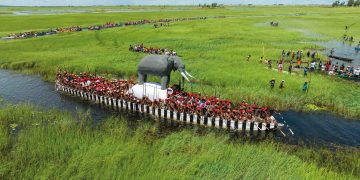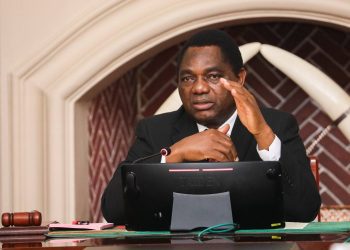By Kelvin Kamayoyo, Zambian Economist and Scholar and BuyZed Campaign Chief Technical Advisor.
The concept of integration and synergies, if carefully replicated to regional and in-country Rivers and Lakes on the continent of Africa has great potential to contribute to building resilience and mitigating against the adverse effects of climate change on society and the economies. It is now a propitious time for the continent of Africa to work towards integrating regional and in-country Rivers and Lakes in order to build climate resilience and smoothly create interconnected water pathways in order to be able to harvest enough water throughout annually. This is against the backdrop that climate change has become a forceful global phenomenon intensifying humanitarian crisis and posing serious threat to the health of the global economy and the environment.
According to António Guterres, United Nations Secretary General in welcoming the decision of the COP27 to establish and operationalize the loss and damage fund, he said that, ‘‘To have any hope of keeping to 1.5 degree limit, we need to massively invest in renewables and end our addiction to fossil fuels. This is essential to keep the 1.5 degree limit within reach – and for everyone to play their part. COP27 concludes with much homework and little time. We are already halfway between the Paris Climate Agreement and the 2030 deadline. We need all hands on deck to drive justice and ambition. This also includes ambition to end the suicidal war on nature that is fueling the climate crisis, driving species to extinction and destroying.’’
Rivers and Lakes carry water and nutrients to areas all around the earth and play a very important part in the water cycle, acting as drainage channels for surface water. Further, Rivers are presumed to be draining nearly 75% of the earth’s land surface. However, Rivers and Lakes in Africa are certainly not an exception to severe imminent threat induced by climate change developments. At the face value, the effects of climate change is specifically yielding negative impact on hydropower generation capacities, agricultural production, employment levels, and export revenues and also contributing to frequent drought, flooding, and rising average temperatures. Apparently, almost all the variables that are impacted by climate change are of equal importance to society’s wellbeing and the global economies in general.
For instance, hydropower generation today is vividly an essential input for economic growth and any such prolonged period of abnormally low rainfall, leading to a shortage of water could cause sustained deficit in electricity supply thereby negatively affecting many economic industries and human life and wildlife too. Notwithstanding the imminent threat of climate change, African countries enjoy abundant waters which is a critical input in hydropower generation and currently countries that produce 85% to 100% electricity from hydropower on the continent include Cameroon, Uganda, Ethiopia, Democratic Republic of Congo, Lesotho, Malawi, Mozambique, Namibia and Zambia. Additionally, most River basins on the continent of Africa are rich in natural resources and their main economic activities are fisheries, mining, agriculture, livestock, tourism, and manufacturing with industries being dependent on the electricity produced in the hydropower plants.
Africa needs to integrate its regional and in-countries’ Rivers and Lakes amidst the imminent threat of climate change events. Climate change is real and has come to stay therefore, the continent must work much more towards identifying fresh opportunities for alternative sustainable growth such as harnessing the commercial value of the Rivers and Lakes through upscaling production of hydropower electricity, innovating variety of tourism packages, promoting agroprocessing and livestock value addition, conserving endangered species and supplying of clean water. This is also cardinal because most sectors on the African continent which demonstrates comparative advantage for competitiveness still remain acutely helpless to withstand climate change adverse impacts, hence, the calls for rapid economic diversification towards green growth anchored on climate friendly investment and green partnerships with less exposure to high risk climate change occurrences and vulnerabilities.
According to the United Nations, Climate Change is the defining issue of our time and we are at a defining moment such that an estimated 3.3 to 3.6 billion people live in contexts that are highly vulnerable to climate changes. Climate change is already affecting the lives, livelihoods, health and other social indicators of people in most River basins, especially those living with scant resources along River banks. Unavoidably, as disasters increase, so will displacement, distress and migration, with incalculable health, psychological, social and economic burdens on society. In Africa, a reasonable number of people depend on Rivers for their way of life and their livelihoods.
Ultimately, the most compelling auxilliary action today is to conserve the major four (4) Rivers on the continent of Africa namely: the Nile River (7,088km); Congo Lualaba River (4,700km); Niger River (4,180km); Zambezi River (2,574km); and including water bodies because water is life and water is valuable. At the core of this purposive endeavour, there is need to embrace climate resilience actions, adopt advanced technology and effectively engage stakeholders in an inclusive approach so as to guarantee maximum protection of the sources of the Rivers and Lakes, and their path ways including encouraging sustainable utilisation of the waters for a better shared future. Ostensibly in Africa, a River is important to the livelihoods of the people because it provides continuously portable fresh water and also helps the surrounding local communities especially smallholder farmers in irrigation but unfortunately all these benefits are now under severe threat due to climate change.
Today planet earth is under severe threat from the undesirable impact of climate change and therefore the emerging persuaive calls for stronger partnerships, increased support to private sector development, sustainable trade and investment facilitation in order to keep it safe and minimise the unprecedented climate adverse occurrences. According to the UNICEF Representative in Gulf, Eltayeb M. Adam during the COP27, he emphasized that: “The climate crisis is the fight of our lives. We must leverage our expertise, pool our resources, and mobilize our collective capabilities to propel action forward.” This could also imply staging an aggressive economic fight against the adverse effects of climate change using innovation and green partnerships as a proactive way of preventing the undesirable climate change events and strengthening the ability of the Rivers and Lakes in order to efficiently adapt to new developments. Therefore, the Campaign to save and conserve regional and in-countries’ African Rivers and Lakes from the severe threat and negative impact of climate change and other environmental dangers should start now in order to keep them healthy and sustainable for effective use in other economic and social aspects convenient for human and wildlife survival.





































